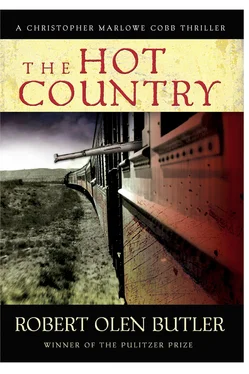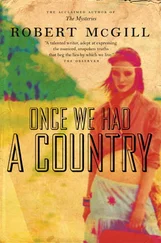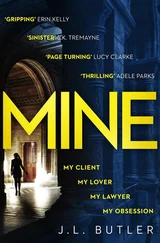And it was not long before he arrived, briskly moving past, dressed in high boots and puttees, khaki pants and shirt, and wearing a slouch hat. A pistol sat on his right hip. And over his shoulder he carried a pair of outsized saddlebags. He passed quickly out of sight.
I tried to hold the image of him in my head. To figure this out. Dressed for the field as he was, he looked incongruously clean and pressed and crisp. But certainly ready to ride. His clothes and their pristine condition seemed familiar to me: He was in costume. It was theater. It was pure theater. I thought of La Mancha as his destination. And I understood. Mensinger didn’t have a rendezvous there with Villa. He had a rendezvous with a horse. It made sense if he wanted to impress the bandito -turned-rebel leader. Villa was where everyone thought he was, in Torreón. But Mensinger would get off at La Mancha to ride those last fifty miles on horseback, far enough to break a real sweat and gather some trail dust. He was a German aristocrat. He’d gotten his combat scar within the stone walls of an ancient university from another aristocrat with whom he then went out drinking. Mensinger was approaching a volatile, emotional, suspicious, uneducated, thieving, cavalry-charging, war-seasoned Mexican, and he had to convince this man of his own credibility.
I hooked my feet in the handles of my bag, pulled my hat down farther over my eyes, and I slept. Dreamlessly, I thought, for I woke with a start with nothing in my head but a feeling of movement and then I thought I was wrong, that this was a dream, for I lifted my head and turned to the window and in the pale first light of the day, across a ragged verge of grass and stones, across a wide, dark calle, was the low adobe sprawl of the Hostal Buen Viaje and I thought perhaps the other Gerhard — for I was Gerhard now to protect my own life — I thought perhaps the other Gerhard was still lying in a room off a courtyard behind that hotel facade, he lay there dreaming his own dream from which he would not wake, and then this vision was gone, it floated past and we were curving, curving, and now before my eyes — or perhaps before only my unconscious mind — was Avenida Guerrero and a familiar row of warehouse buildings, and flashing past was the very one in whose shadow, just out of sight, a knife was lifted to kill a boy and I fought for him. But these vanished now too. I blinked hard, and still the streets passed by, with the tile-roofed houses and the gray scattered tombs of the Cementerio General and the wide alameda at the south end of Independencia and the great wooden bowl of the bullfighting ring. These were recognizable but irrelevant to me, and I realized that I was not dreaming, that this was Vera Cruz flowing past me, and I settled back again, closed my eyes. But I was awake.
I opened my eyes. I removed my hat. We were running out of the trees of Vera Cruz and the city vanished, replaced by a stretch of marsh, the thin veneer of water among the rushes starting to lighten as the sun cracked the horizon behind us, with a scattering of slow-stalking blue herons looking black in this early light. And now the water vanished too and the sands took up, lifting into minor dunes, and our train slowed abruptly. I pressed the side of my face against the window to look forward. I saw branch tracks heading off south and switching tracks and now a siding and boxcars with uniformed men— Federales— sitting in the doors. Our own train was crying out beneath us, as we ground hard to a stop. The engine pitched low. I understood what would happen now. My hand went to Gerhard’s German passport, just to touch it, and I recognized the danger of that thought. I rethought it: I touched my own German passport, just to reassure myself it was there. Mine. I was Gerhard Vogel.
A low Spanish murmuring ruffled through the car and I looked at my nearby fellow first-class travelers. They all seemed to be Mexicans, well-dressed ones. Sitting next to me was an old man in a cream suit, a mestizo with a massive gray Porfirio Díaz mustache. In the seats in front of me were a middle-aged couple, he also in a suit, American-style serge, she wearing a bright blue rebozo draped over her head and shoulders. No possible Germans were nearby to find my speech suspicious. In spite of my taste for irony and the impulse to indulge in German double-talk, I decided my best course was to inject a clear undercurrent of an admittedly stage-German accent into a simplified Spanish and fake a lapse into the language of the Fatherland only if absolutely necessary.
Two Federales in proper regimental uniforms were beginning to work their way down the aisle, a conductor trailing them. The Federales were looking at each passenger intently, asking for papers from some, passing others by with only a single lingering glance, the conductor checking tickets of everyone in their wake. I couldn’t clearly see if there were other non-Mexicans farther up, but the two government soldiers did pause, once, and then again, and then once again, to check documents closely, and I turned my face to the window as if unconcerned. But as their voices came near, stopping a few rows in front of me to ask for a pasaporte, I thought now it would seem evasive to be looking away from them when they arrived. And if I could, I wanted to see who it was they would expect to be carrying an actual passport.
The Federales were several rows down and focused on the seats on the other side of the aisle. I moved my head very slightly to the right, not wanting to seem anxious, and I could see between the couple in front of me and barely through the two people in front of them and then my sight was mostly blocked by a black sombrero with silver trim. The soldiers were soon satisfied, and they moved this way. One was lagging behind a little, deferentially, and the senior man turned to this side of the aisle. He had a dark face, carefully twirled black mustaches, a sharp-scanning eye. I knew I shouldn’t be looking out the window but I shouldn’t be staring at him either. So I eased back in my seat, waited with a vaguely sleepy stare in front of me, as the soldiers moved closer.
Now I saw them in my periphery as they approached my row, and I looked up, slowly, as if this was all quite routine. And I knew I was thinking too much. What I’d learned about actors — even the hammiest of them — was that they worked out their self-consciousness in rehearsals. In performance, even the broadest, phoniest gestures were actually executed straight from the body. I was thinking too much, and now I was thinking too much about thinking too much, as I stared up at the officer who was clearly in charge. His mustaches were so black and the confluence of lines converging on the outer corners of his eyes were so deep that I wondered if he rinsed indigo and henna into his bigote grande like a fading leading man.
“Good morning,” he said to me in English, going straight to the top of his list of targets.
My head cocked slightly in brief incomprehension — which I was pleased to note had occurred by an actor’s reflex — though I also needed to stop noting my own performance, even when good, as that was the time when actors tended to muff their lines.
“ Guten Morgen, ” I said, not really capable of going very far past that if this man happened to know any German. His uniform was far too correct for the conscript Federales Maass had been able to gather to fight for him. He even had pips on his shoulder that I could read: a captain. A real soldier. Not an inflated rurale . Not a field captain elevated in battle from corporal with all the officers around him shredded by bullets and shrapnel. These onyx-stone black eyes had a legitimate Kapitän behind them, lately arrived from the capital and tasked with finding guys like me. He could even have known some real German. That was the great risk of this moment.
Читать дальше












